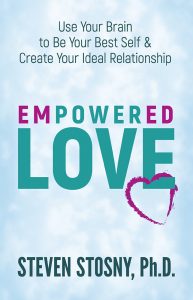Creating Your Best Self


Based on his new book Empowered Love, psychiatrist and couples therapist Dr. Stosny provides readers with an in depth description on how partners differ due to a divide between our Adult and our Toddler brains. Below Dr. Stosny discusses the affects between these dynamics and how to overcome the destructive impulses in order to better ourselves and achieve the ‘power love’ relationship with others.
What inspired you to write a book on the development of relationships and how partners interact with one another based on their relationship dynamics?
In more than a quarter century of clinical practice, I’ve been fascinated, troubled, and occasionally tormented by three questions:
Why do so many smart and creative people make the same mistakes over and over?
At what point does the unavoidable emotional pain of life become entirely avoidable suffering?
How do we avoid suffering, while remaining vibrant and passionate about life?
The answers lie in habituation – under stress, all animals, including humans, retreat to previously learned habits. In love relationships, where we feel the most vulnerable and powerless, we are prone to retreat to emotion regulation habits learned in toddlerhood.
Can you elaborate on the differences between the “toddler brain” and the “adult brain”?
The part of the brain that dominates the emotional world of toddlers is the primitive limbic system, which is common to all mammals. Although the brain is always changing, the limbic system is pretty much fully developed on a structural level by age 3.
The primary survival function of the limbic system is to generate an alarm. But it has little reality-testing capability, that is, it can’t distinguish what is really happening in the environment from what is being thought, imagined, or dreamt, which is why we are capable of intense emotions when nothing is happening around us, invoked by thoughts, memories, imagination, or dreams.
Reality-testing falls to the prefrontal cortex – the Adult brain. The prefrontal cortex is unique to humans, at least in the vastly articulated form observed by scientists, and not fully myelinated until around age 28. Its primary function is to interpret and organize perceptions, sensations, emotions, thoughts, and impulses into a coherent model of reality. It regulates Toddler brain alarms by assessing their accuracy and appropriateness within the model of reality it has organized. It then formulates a blend of thoughts, emotions, and behavior to negotiate the environment, using sophisticated tools like calculations and analysis. It can set goals and meet them, based not only on the drives and preferences, but on its unique ability to create concepts of value.
The Adult brain provides a level of self-awareness and awareness of others unparalleled in the animal world, by virtue of what psychologist’s call, “theory of mind.” That’s the ability to ascribe mental states, such as beliefs, feelings, motives, and desires, to self and others. Perhaps most important, in terms of social interaction, the Adult brain understands that others have beliefs, desires, and intentions that are different from its own. It is, therefore, able to mediate our most humane qualities, such as appreciation and higher order compassion (sympathy for vulnerabilities we do not share). It is thus able to create connections of value with other people.
If cognitive dissonance plays a roles in relationships, do you believe that social media influences this, in which it affects the toddler/adult brain?
Social media, along with other factors, contribute to the Culture of Toddlerhood by reinforcing:
- Entitlement (ever-expanding perception of “rights” and demands)
- Self-obsession (inability to see perspectives that go beyond personal experience)
- Splitting (good or bad, angel or demon, all or nothing)
- Intolerance of disagreement and uncertainty
- Elevation of feelings over values
- Substituting power for value (reacting to temporarily diminished self-value by exerting power)
How do you determine whether your partner is portraying either the adult brain or the toddler brain? How can someone change their toddler-like mindset when pursuing an intimate relationship?
If you perceive your partner to be saying, “Mine (My way)!” or “No!” you are both in the Toddler brain. Your only chance of getting your partner to the Adult brain is to get to your own, where you can be more compassionate and kind instead of reactive and retaliatory.
Think about how to improve your experience rather than complain about it or blame it on someone. Connect regret over past mistakes to strategies for future success. Because emotions are primarily motivations and we can’t motivate the past, we feel powerless when thinking about the past and more empowered when we think of what we will do in the future.
Why are blame, avoidance, and denial so common within the adult brain and in relationships?
Blame, denial, and avoidance are Toddler brain coping mechanisms which begin habit-formation between 2 and 3 years old. They persist into adulthood because they allow us a temporary reprieve from vulnerable feelings like guilt, shame, sadness, and fear. They occur most often in love relationships because we are most likely to feel vulnerable in love relationships.
How can adults effectively manage their stress, anger, and/or jealousy without letting these emotions affect personal relationships?
To keep negativity from affecting love relationships, we must allow the positivity of love relationships to influence how we deal with the world. When we act on our deepest, most humane values of compassion, kindness, appreciation, and protection of loved ones, we greatly reduce the guilt and shame that turn into anger and jealousy, while diminishing the anxiety and resentment that produce the negative effects of stress.
How can relationships succeed in order to achieve this notion of ‘power love’?
On the fundamental level we must replace the Toddler brain habits of blame, denial, and avoidance with Adult brain habits of improve, appreciate, connect, and protect. More broadly, power love derives from our basic humanity and deepest values. Toddler brain love derives from temporary feelings, self-obsession, impulsivity, and inability to act in our long-term best interests.
After reading ‘Empowered Love’, I managed to take in a lot of useful and valuable information when it comes to handling my own personal relationship(s). What do you hope readers will take from reading your book?
Recognize that you like yourself more when compassionate, kind, or appreciative to loved ones and that you like yourself less when resentful, angry, or contemptuous of them.
Whatever we focus on becomes more important than what we don’t focus on. Focus on what you want, rather than what you don’t want. Focus on how you want to feel, and your Adult brain will show you how to get there. Focus on the kind of person, partner, and parent you most want to be.

Many thanks to Dr. Stosny for being generous with his time and insights. Pre-order Empowered Love.Out February 15!





Responses